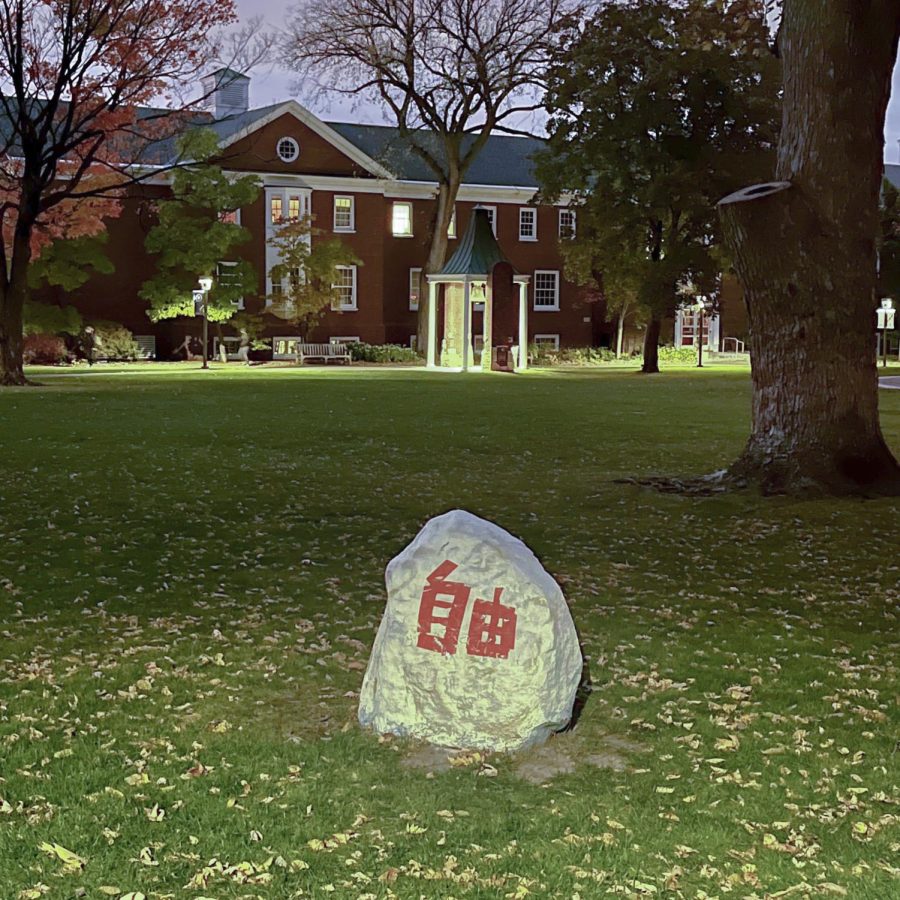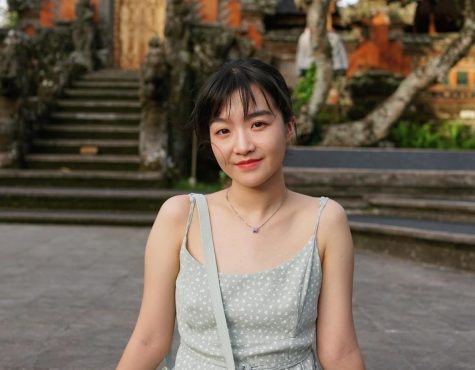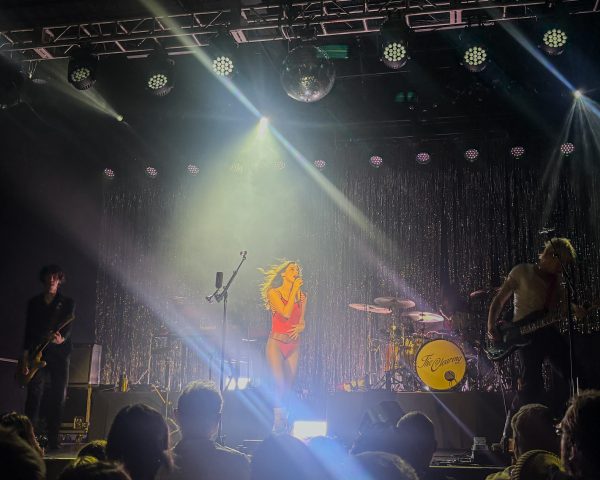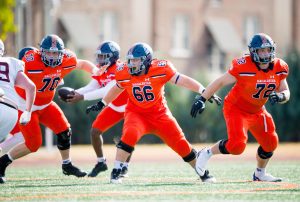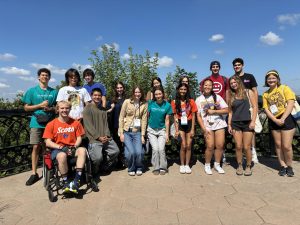The disparity between international and U.S. student activism
November 17, 2022
On Oct. 10, more than 50 students gathered in the lobby of the Janet Wallace Fine Arts Center to protest the Congress to Campus event that debated reproduction rights. Most of the protest participants were U.S. domestic students. Among the many protest signs held high in English, only one small sign was written in Hebrew, quoting from The Mishnah, a written collection of Jewish oral tradition, to support abortion from a religious perspective.
On Oct. 16, three days after the Beijing Sitong Bridge protest of President Xi’s dictatorship in China, the Macalester Rock was taped with two large, eye-catching orange Chinese words 自由 (liberty) and 民主 (democracy).
Two days later, the “liberty” disappeared, and Chinese chalk writing appeared on the pavement next to the rock: “还我自由” (Please return my liberty). As students passed by on this path, the chalk writing faded away, and new Halloween pumpkin paintings eventually covered the rock. This participant-less “rock protest” came and went suddenly and quietly.
As different forms of student activism are taking place every day on Macalester’s campus, there seems to be a great disparity between domestic and international students. While most participants in U.S. political and social-related demonstrations are domestic students, international students struggle to raise awareness for issues happening back home on an American campus.
What is the nuance behind this disparity? How can participation in activism become difficult? What does it truly mean to be an international student activist?
Language is one barrier that hinders people from even knowing about the existence of a protest. Lulu Qiu, the Chinese Lab Instructor in Asian Language and Cultures Department, said her students had asked her about the meaning of the Chinese characters on the rock and pavement. She needed to explain the context of the protest and China’s political status quo for students to understand the deeper connotation of those writings.
Yiming Zhu ’23, from China, who recently shared fliers about the Mahsa Amini protest in Iran on social media, felt there is more related information he could have missed due to the language barrier.
“For Iranians, they probably have their own software preference rather than Facebook Messenger, or they have local [gathering] groups, which I don’t know,” Zhu explained. “They probably write their protest flyers in their own languages … there’s a lot of barriers for people from two different countries to protest together.”
On the other hand, the lack of familiarity with U.S. politics and activist culture is a common feeling shared by many international students who hardly have any experience with activism in the U.S.
Putri Cahyudi ’25, from Ulaanbaatar, Mongolia, has limited exposure to activist culture back home.
“Although I’ve heard a lot about protests that happened in the U.S. through social media, I found it kind of challenging to just insert myself in the whole protests and activism things,” Cahyudi said.
After Cahyudi declared International Studies and Political Science double majors this semester, she learned more about activism-related events through department emails.
“I would like to live here after graduating … So I feel like that’s something that’s part of what I have to do,” she said.
But as she attempts to inform herself more, she finds it hard to truly grasp the idea of U.S. politics. Her professor would remind students to stay tuned for the mid-term election and be ready to discuss in class.
“I had to go out [of] my way to research… like what is even midterms,” Cahyudi said.
A similar sense of confusion and lack of U.S. contextual knowledge was also experienced by Livvy Peters ’25, even though she is a U.S. citizen.
“I was born and grew up in Malaysia … I never really had much of an opportunity to learn about the U.S. [in Malaysian schools],” she said.
Peters finds herself in an awkward middle ground, where she cannot fully participate in civic engagement on either side.
“My identities [are] like kind of split in half, like I’m supposed to be an American, but I don’t feel American,” she said. “But I also can’t completely identify as Malaysian just because I was born and raised there.”
Elections are one of the things Peters has trouble engaging with in both Malaysia and the U.S. due to complications with her citizenship, and it is not easy for other people to understand the complexity of this mixed international identity.
“If I told someone I don’t vote, they’d be like, ‘What the heck, you’re American, you’re not voting? What are you doing?’ And I’m like, I just don’t know anything about it,” she said, explaining her frustration. “So I just kind of strayed away from [activism] entirely … which I feel bad about … I just didn’t grow up in this kind of structure.”
Foreign citizenship also detaches some international students from American culture; they don’t feel relevant in U.S.-themed activism.
“Since I’m not a citizen of this country, I feel I don’t feel obligated to protest,” Anatoliy Cherednichenko ’23, from Crimea, Ukraine, said. “United States citizens go to protest because they are citizens of this country, and they define the future … I’m not interested in making changes in this country, because I think I don’t have a right.”
For Cherednichenko, performative activism can sometimes be too binary, and he worries that other people categorize him into a specific political stance accordingly.
“I don’t care whether you’re Republican or Democrat, they’ve never really made a difference to me,” he said. “I come from a background where it’s never just black and white … this kind of philosophy of just supporting either side, I don’t really agree with it.”
Besides lack of familiarity and relevance, safety is the biggest concern for most international students when they think about being part of activism. One of the safety concerns is related to political sensitivity and the taboo of activism back home.
Qiu said she would be cautious about mentioning controversial historical events or activists’ names to people when she felt unsure about their political stance. Peters said that her Malaysian friend at Mac, who actively engages in different activism, has to be careful about certain wording due to censorship in Malaysia.
In addition, some worried showing up at a protest would pose a potential risk to their student visa and immigration status.
“[If arrested or interrogated by the police], that would impact us a lot more than they would’ve impacted domestic students because we don’t have the security that being a citizen offers,” Mahmoud Majdi ’24, from Ouarzazate, Morocco, said.
Paul Dosh, associate professor of political science, also mentioned this disadvantage for international students.
“[Citizenship status] might create vulnerability for a student activist,” he said.
Dosh has had hundreds of conversations around student activism with students over his nearly 20 years at Macalester. He considers school environments to provide a shelter for students to voice out their needs and protest safely.
“But I think that safety is not universal across all students [in the U.S.],” Dosh acknowledged.
He thinks it is essential for different senior stakeholders to protect students’ safety and freedom of expression.
“[It takes] teachers, professors, college administrators, to have a sense collectively that participating in activism is an important part of a student’s education and self-education,” he said.
Dosh recalled in May 2006, an immigration rights protest marched in St. Paul from the cathedral to the capitol, including hundreds of Macalester students, many of whom are undocumented.
“That was a remarkable event [where] you had whole families that had some degree of legal vulnerability,” he said. “Students felt supported and perhaps safer because there was such a high participation by staff and faculty. So, they didn’t feel that they were alone.”
International Student Programs (ISP) is also making efforts to build a strong support system for international students to feel secure and cared for by the Macalester community. For example, in the fall of 2020, when protests related to Black Lives Matter (BLM) were at a peak in the twin cities, ISP staff put together a document that included safety guidance for joining a protest as an international student. It also contains resources to learn about BLM-related social movements and legal support.
Luyen Phan, Associate Director for Compliance at ISP, understands fully that some international students might feel uncomfortable showing up to protest in the U.S. due to safety concerns.
“One thing that we tried to let students know is that your visa status generally is not in jeopardy if you do it in safe and legal ways,” he said.
Phan emphasized the three most important principles when joining a protest: bringing a legal ID, not going alone, and always being sensitive to anything violent happening in their surroundings.
ISP also recognized that the lack of U.S. contextual knowledge could hinder students from participating in certain political and cultural discussions. As a result, ISP recently launched a survey for international students to address their confusion about U.S.-related references in class and obstacles they are facing academically that they feel domestic students don’t share. Some feedback they received included being unfamiliar with MLK and the Civil Rights Movement and only focusing on U.S. policies in an “International Perspective” titled class at Mac.
“Whatever feedback students give us, we can share with our colleagues, faculty, and other staff members to understand [not to] be mad and sad that [international students] are not engaged, because maybe they don’t have the context or feel comfortable enough to provide ideas,” Phan said.
Compared to safety and a lack of contextual knowledge, a more profound challenge is embedded under this “activism dilemma.” That is the fact of just being an international student itself.
The academic and life pressures of being an international student often leave them with no time or energy for anything else, such as club and activism events, and extra financial, academic, and emotional burdens are often overlooked.
“From tax documents to immigration documents, to dealing with family and politics back home, to try and understand how politics works here … at the end of when I finish all those tasks, the last thing I think about is participating in a march or protest or organizing for a cause,” Majdi from Morocco said. “In my opinion, [being an activist] can be a luxury for some people.”
Even in the face of layers of obstacles, international students are not just sitting back and being politically indifferent. On the contrary, many of them are striving to make their voice heard and bring changes to the community they care about.
In the summer of 2021, without the concern of schoolwork, Majdi was able to march with protesters who demonstrated against violence towards Palestinians in Israel in Columbia Heights, Minnesota. He considers conflicts around The Occupied Territories very dear to him. Growing up as the son of a union leader in Morocco, he went to similar marches with his dad and people in his town regularly.
“Identifying with people [at the Stand with Palestinians protest] offers me some sort of belonging … brings a sense of fulfillment that I used to have back home but [am] unable to have here,” Majdi said.
Shosuke Noma ’23 from Tokyo, Japan, also showed up in that protest and a few BLM demonstrations after the murder of Daunte Wright. But most of the time, his role was as a photojournalist.
“I felt positive of me being there as a non-U.S. citizen,” he said. “Especially as a photographer, I think I can spread and share the situation with more people.”
International students also sought means of activism on campus, for example, joining the student government and pushing actual changes from the administrative level. Tom Liu ’24 from Qingdao, China, was one of the executive board members and Chair of the Academic Affairs Committee (AAC) in the 2021-22 academic year.
After the sit-in that protested the administration’s lack of accessibility to BIPOC students and racist incidents at Macalester, Liu and his colleagues had a coffee session with the school administration to demonstrate students’ need for mental health and well-being during the pandemic turmoil.
“Students should consider their rights, their access to health care and education, to mental and physical well-being as a necessity,” Liu said. “And whenever that necessity is barred, exercising activism should be considered an option, a very strong one.”
Being a mediator between the student body and administration enabled Liu to see perspectives from both sides and realize the complications underlying an institutional problem.
“Sometimes the faculties or senior staff, the so-called perpetrators, are as impacted as we are, but due to various circumstances, they cannot bring immediate solutions to the current broken system themselves,” he said. “It is the system that is broken, not the people within it.”
Students who are concerned about safety issues and are not comfortable with the performative nature of protest approach activism in more subtle ways, such as online activism and fundraising.
Cherednichenko has actively participated in campaigns related to wars in his home country Ukraine. He and his friends opened an Instagram account called Mac4Ukraine, which fundraised about $12,000 from students and faculty to assist people suffering from the war.
Now he works for a non-profit organization called Alight, which helps bring fleeing Ukrainian refugees to the U.S. for shelter. He recently met with Macalester faculty and staff interested in becoming an American sponsor for Ukrainian families.
“I feel like it’s my form of activism,” Cherednicheko said. “I am not the kind of guy who can go to protest and scream too much, I am more on the quiet side … I feel an obligation to support my country in any way I can, and this is how I found myself to be supporting that.”
“There’s an awful lot of work that happens behind the scenes that is often safer, but it’s vitally important.” Dosh said. “Organizing work, poster design, sign making, fundraising, networking, outreach relationship building, facilitating meetings, 90% of the work is behind the protest march.”
Being an international student activist can be a challenging and complicated task because it requires resources, including finance, transportation and information. It also demands time, mentality and courage. These barriers not only create a great disparity between U.S. and International related activism but, more fundamentally, disparities between all different cultures.
“The hard part students have is how to share their nation with other people, so people know what’s happening in their country and how that’s affecting them … not just Americans, but international students don’t know about what’s going on in [each other’s] country,” Phan said.
He acknowledged there are limitations for ISP to make direct and tangible assistance, but that at least ISP staff can let the students know that people are thinking of them, knowing they are struggling. He pointed at the bulletin board at the ISP office that provide a space for students to share their voice, including a yellow poster of “TAKE ACTION TO STOP THE WAR ON TIGRAY.”
“We try to provide them with suggestions or ideas and how they could get friends that kind of work together to share that information.” Phan said.
There are many ways that students from different backgrounds can make changes in society, whether it is a grand protest, a quick retweet of a poster, a piece of art, or simply hearing friends talk about their home country. Student activism is an ever-robust concept. People each have their own definitions of activism, and it is always flourishing on campus and in this city.
For those who may have not yet participated in any form of activism and are interested in doing so, the following advice from Dosh might be helpful.
“Rather than approaching with a sense of what can I do to help and immediately trying to be useful, first try to be present, and listen, then begin to build relationships and become part of that,” he said.
*Rayan Abubaker Ahmed Hamid was also interviewed and contributed perspective for this article.

